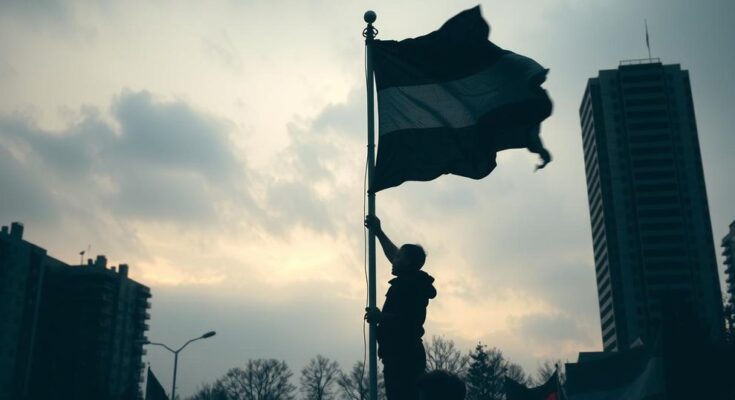About 40 protesters were arrested in Nigeria for waving Russian flags during demonstrations against high living costs and perceived government failures. The army chief labeled the act as treasonous. The protests, ongoing for six days, have claimed at least 13 lives. President Tinubu faces backlash over his policy decisions, particularly the removal of fuel subsidies. The Russian embassy has distanced itself from the protesters’ actions, emphasizing non-interference.
Approximately 40 demonstrators were arrested in northern Nigeria during protests against rising living costs and perceived poor governance. Protesters displayed Russia’s national flag, leading the army chief, Christopher Musa, to declare such actions treasonous. The nationwide protests, which have lasted six days, resulted in at least seven fatalities and over 700 arrests, with demonstrators expressing their hunger and voicing support for Russian President Vladimir Putin.
Reports have suggested that some Nigeria protesters have appealed to Russia for assistance, highlighting a growing sentiment that diverges from the nation’s traditional Western alliances. This comes amid a backdrop of increasing dissatisfaction with civilian governments in West Africa, particularly following recent military coups that have shifted allegiances.
President Bola Tinubu, who assumed office in May 2023, has seen his popularity plummet as citizens attribute rising living costs to his policies, particularly the removal of fuel subsidies. Amidst escalating unrest, Tinubu has called for patience and dialogue, urging an end to protests, while military leaders have signaled zero tolerance for foreign flags at demonstrations.
The Russian embassy in Nigeria distanced itself from the protests, emphasizing that the flags were the protesters’ personal expression and that Russia does not interfere in Nigeria’s domestic issues. In the wake of the protests, authorities have imposed curfews in several states, impacting the daily life of millions.
Amnesty International reported significant violence against protesters, indicating that 13 individuals have died since the protests began. Tinubu condemned looting that occurred alongside the protests and reiterated his commitment to address the grievances that fueled the unrest.
The protests in Nigeria emerged as the population expressed frustration over soaring prices and inadequate governance. The situation has been exacerbated by President Tinubu’s policies, especially the removal of fuel subsidies that has led to dramatic increases in living costs. Recent shifts in regional politics have also contributed to a growing affinity for Russia among some segments of the population, which the government perceives as a threat to its alliances with Western nations. The increasing unrest reflects broader discontent with leadership and the socioeconomic environment in Nigeria and surrounding West African nations.
The recent protests in Nigeria, marked by the arrest of approximately 40 individuals for displaying Russian flags, underscore rising dissatisfaction with the government’s handling of economic challenges. The events highlight a significant shift in public sentiment and potential geopolitical implications as citizens navigate their frustrations with soaring living costs and governance issues. The government’s efforts to quell dissent and the complexities of foreign influence further complicate Nigeria’s path forward.
Original Source: www.bbc.com




